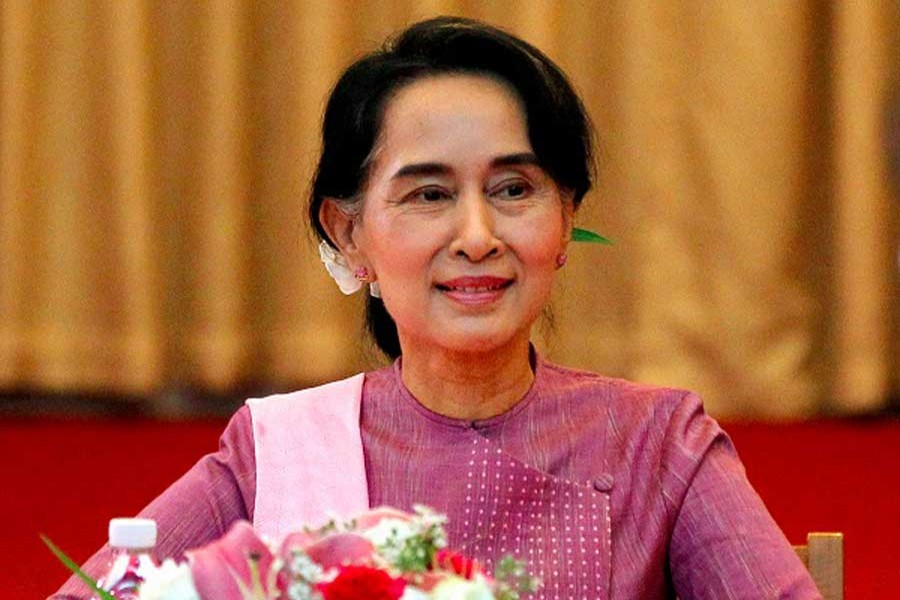Myanmar' State Counsellor Aung San Suu Kyi underscored Myanmar’s readiness to receive the verified Rohingyas and necessary cooperation of Bangladesh to expedite the repatriation process.
She said this when a UN Security Council delegation met Myanmar's civilian leader Aung San Suu Kyi at the Ministry of Foreign Affairs Naypyitaw, Myanmar on Monday.
She said it is important for Bangladesh side to use prescribed forms agreed by both countries as early as possible for verification, according to Myanmar State Councellor’s Office.
The State Counsellor received the delegation composed of Permanent Representatives to the United Nations/ representatives from immediate neighbours of Myanmar including current ASEAN Chair, and Member States of the United Nations Security Council upon their arrival in Nay Pyi Taw.
The State Counsellor also explained to the delegation on the matters pertaining to providing humanitarian assistance to affected communities, rebuilding trust and confidence among communities, citizenship issue, on-going closure of IDP camps, issuance of national verification cards(NVCs), restoring rule of law, issue of resettlement on the international boundary line between the two countries, possible recurrence of terrorist attacks at any time, necessity to find the root cause of the conflict, prevention of hate speech, and encouragement for school education.
Afterwards, the delegation met with Senior-General Min Aung Hlaing, Commander-in-Chief of Defence Services at the office of the Commander-in-Chief in the afternoon.
Then, the delegation held a comprehensive discussion with Kyaw Tint Swe, Union Minister for the Office of the State Counsellor, Thaung Tun, Union Minister for the Office of the Union Government, Dr. Win Myat Aye, Union Minister for Social Welfare, Relief and Resettlement and Chairman of the Implementation Committee on Recommendations on Rakhine State, Kyaw Tin, Union Minister for International Cooperation, Dr. Aung Tun Thet, Chief Coordinator of Union Enterprise for Humanitarian Assistance, Resettlement, and Development in Rakhine (UEHRD), Win Mra, Tun Myat, Khin Maung Lay, Hla Myint and Dr. Daw Khin Nyo, who are national members of Advisory Board on Rakhine State.
The UN Security Council delegation on Tuesday was visiting volatile areas of Myanmar's Rakhine state, from where hundreds of thousands of Rohingya Muslims have fled military-led violence to see firsthand the aftermath of the army's crackdown as well as Myanmar's preparations for taking back the refugees, reports the Associated Press.
The 15-member delegation co-led by Security Council President Gustavo Meza-Cuadra was joined by Rakhine state and central government officials and ministers heading to Maungdaw in northern Rakhine where the Myanmar government has built reception camps for the Rohingya refugees now living in camps and other temporary shelters in Bangladesh.
"The delegation will be visiting Taungpyo and Hla Phoe Khaung reception camps in Maungdaw region," said Myint Khine, a township administrator of Maungdaw.
Bangladesh and Myanmar agreed in December to begin repatriating the refugees in January, but there were concerns among rights groups and Rohingya that they would be forced to return and face unsafe conditions in Myanmar.
The UN refugee agency and Bangladesh recently finalized a memorandum of understanding that said the repatriation process must be "safe, voluntary and dignified ... in line with international standards."
The U.N. refugee chief, Filippo Grandi, warned in February that conditions aren't right for Rohingya Muslims to voluntarily return to Myanmar because its government hasn't addressed their exclusion, denial of rights and lack of citizenship.
UN Secretary-General Antonio Guterres has repeatedly stressed that the Rohingyas return must be voluntary and they must be allowed to return to their homes which will require a huge investment for reconstruction because of the destruction.
Some human rights activists would like to see more aggressive action by the UN.
"The other thing the Security Council should do is refer the situation in Rakhine state to the International Criminal Court," Kenneth Roth, the executive director of Human Rights Watch, said Friday in a speech to journalists in Yangon, Myanmar's biggest city.
"The crimes against humanity that were committed against the Rohingya population were clearly of the gravity and severity that they warrant prosecution by the ICC. If impunity were to prevail it would be an enormous injustice to the victims and their families, and it would only encourage a repetition of these kinds of mass atrocities," Roth said.


